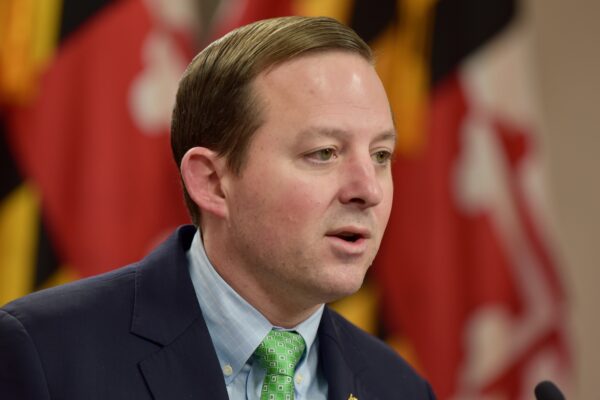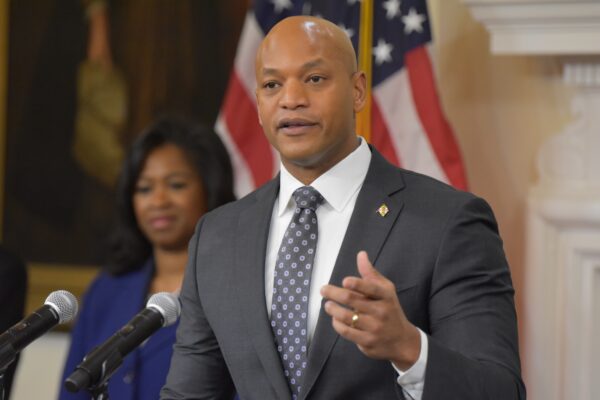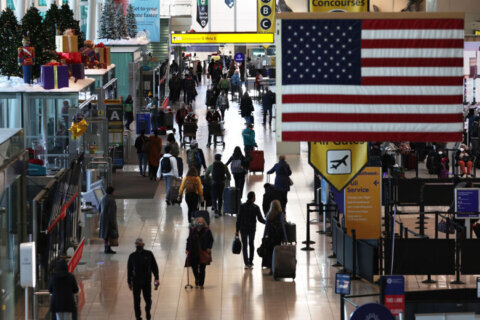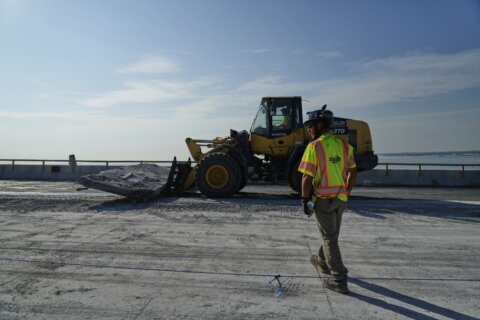This article was republished with permission from WTOP’s news partners at Maryland Matters. Sign up for Maryland Matters’ free email subscription today.
House and Senate leaders Friday introduced bills that authorize the governor to ease the financial impact to workers at the Port of Baltimore and related businesses following the collapse of the Francis Scott Key Bridge.
House Bill 1526 and the companion SB 1188 authorize Gov. Wes Moore (D) to use money in the state’s roughly $2 billion Rainy Day Fund. Money pulled from the account would go to replace wages lost from a shutdown of the port. It can also be used to ease financial strains on businesses dependent on port operations as well as incentivizing companies to remain in the area.

“This bill is related to the workers and small businesses that are in and around the port,” said Senate President Bill Ferguson (D-Baltimore City).
The bills were announced Wednesday.
Legislative leaders, Gov. Wes Moore (D) and state transportation officials warn of significant economic effects due to the bridge collapse early Tuesday. The 47-year-old span over the Patapsco River that connected Baltimore and Anne Arundel counties is now blocking the shipping channel.
The port has ended all ship operations in and out of Baltimore while the U.S. Army Corps of Engineers works to clear the debris and reopen the shipping lane.
Closure of the port could affect thousands of workers at an estimated cost of $15 million per day. There is no timeline for when the port can reopen.
“The sad reality is there are hundreds of businesses, thousands of individuals who that uncertainty means they don’t know what they are doing with their livelihood,” Ferguson said.
The bill does not cap how much can be drawn from the budget stabilization account but does require a seven-day legislative review.
The bill also requires the state to seek federal reimbursement.
President Biden Tuesday promised federal aid to cover the full cost of replacing the bridge.
The Army Corps of Engineers is picking up the costs of clearing the bridge debris and reopening the shipping channel.
Ferguson and House Judiciary Committee Chair Luke Clippinger, both Democrats who represent the district where the port is located, are lead sponsors of the respective bills.
The Senate version of the bill has been scheduled for a hearing Tuesday morning in the Finance Committee, and it could be debated on the Senate floor as early as Wednesday. Lawmakers are expected to move quickly in the final days of the legislative session.
The proposal is one of two currently before the General Assembly.
The Senate Education, Energy and the Environment Committee held a hearing Friday on SB 1187, sponsored by Sen. Bryan Simonaire (R-Anne Arundel).
The bill allows for a one-year state of emergency in cases of catastrophic damage to infrastructure with one-year renewals. Currently, a state of emergency order is limited to 30 days at a time and can be renewed at the governor’s discretion.
Simonaire’s bill removes the broader powers available under the 30-day state of emergency order.
The committee opted not to vote on the bill Friday. With one week left, Senate leaders appear focused on efforts to reopen the port and ease the monetary impact of an extended shutdown.
Moore, in a news conference Friday afternoon, said he will also propose last-minute legislation related to the collapse of the bridge.

“We also need to ensure that we pass legislation to support the families and the victims of the bridge collapse and everyone else who has been affected by this emergency,” said Moore. “I’ll be proposing the creation of a permanent state scholarship for the children of surviving spouses of transportation workers who lost their lives on this job.”
The governor’s proposed initiative is expected to be amended on to an undisclosed existing piece of legislation.
Eight people — mostly a crew of workers patching potholes — were on the bridge when it collapsed. Two people survived. The bodies of two others were recovered earlier this week. The remaining four are presumed dead but recovery operations are temporarily suspended because of hazardous conditions.
During his news conference near the collapsed bridge, Moore poked lawmakers who continue to work on a $63 billion spending package for the coming year.
The House and Senate met in conference committee earlier this week, resolving differences in the versions of the budgets each passed. Still unresolved is a House proposal that includes $1.2 billion in taxes and gaming revenues not favored by the Senate.
The House and Senate versions of the budget were passed before the bridge collapsed. Neither contains spending provisions related to the ongoing recovery efforts.
Leaders from the two chambers are expected to meet again on Monday afternoon.
“But to the members of the Maryland General Assembly, we know this: We are 10 days away from the conclusion of this legislative session and there’s a lot of work to do. The top priority in that work is going to be finalizing our budget,” Moore said. “My administration proposed a responsible budget that makes important investments and housing and child care and environmental protection and transportation. So now, it is vital that the House and the Senate find compromise as soon as possible, pass the budget and provide certainty at this challenging and uncertain time.”







